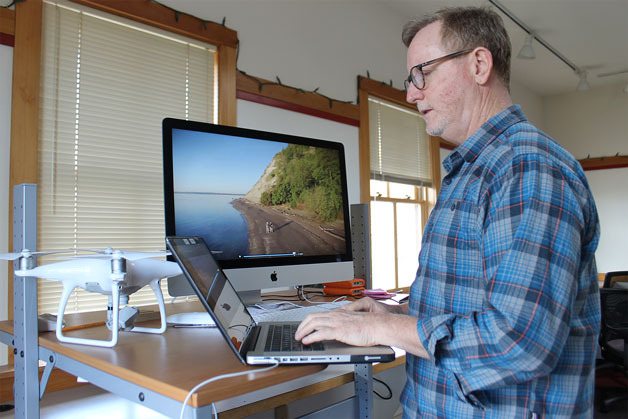Looking around FusionSpark Media co-founder Russell Sparkman’s office, one thing becomes abundantly clear — it’s unoccupied save Sparkman.
That’s because the Langley business is heavily reliant on the cyber world, where Sparkman’s team conducts most of their business on the web, editing video content as well as other forms of media. Internet service is a key component in his work, and a poor connection means a slower workflow.
Internet speed could increase by as much as 10 times in the near future, with Whidbey Telecom building an all-fiber optic cable network to be used by businesses, residents and government.
Whidbey Telecom Co-CEO George Henny and Chief Operating Officer Chris Burns see the fiber cabling as a means of improving business vitality in commercial areas such as Langley or Freeland while also addressing an ever-increasing need for improved bandwidth for South Whidbey residents. In other words, they are “future-proofing” the community, an investment that is estimated to be over $10 million.
“We are looking at really creative ways of helping every economic level to thrive in some way,” Henny said. “If we can help lift them up in some way, we believe we can truly make this community amazing. Not because of what we do, but how we are helping others thrive, and that makes us incredibly proud to contribute to our community and really honored.”
Sparkman said his business is challenged in its ability to upload gigabytes of video to a team that will edit it elsewhere. The new cabling would be a step up, he said.
“That would be at least part of our workflow that would be improved by having the optical speeds for uploading and downloading content,” Sparkman said.
Henny and Burns said the new cabling will also put Internet service on South Whidbey in the top percentile in speed across the nation. Pricing is still being determined, though the company is looking at other communities and its competitors to ensure prices are affordable for everyone. Rates will be adjusted according to the amount of usage, Henny said
“It just needs to be simple, intuitive and fair to everybody,” Henny said.
Using two zoning distinctions labeled “green” and “blue,” the cables will be installed periodically throughout the rest of the year. Green zones encompass a larger area of service, including Langley, Clinton, Bayview, Freeland and the South Whidbey School District, while blue zones entail high-volume residential areas such as Useless Bay or Holmes Harbor.
Green zones will allow customers to upload and download with speeds of up to 10 gigabits per second, while blue zones will allow for speeds of 1 gigabit per second. Gigabits are a unit for digital information or computer storage.
Langley Chamber of Commerce Executive Director Michaeleen McGarry, who is also a partner at Element Code Project in Freeland, said her web-based development firm’s productivity will increase. She also agreed that the efficiency of telecommuting will be improved.
“The upload and download is going to be a lot faster,” McGarry said. “Specifically with telecommuting, if you’re trying to work on something that is not local here, like on your machine, you can actually communicate with it a lot faster.”
Fiber cables were installed in Freeland’s commercial core two years ago. Installation is underway for the rest of Freeland, as well as Langley, while other areas are ongoing.
“Our engineers and crews are performing most of the work, but we’ll probably bring in some additional contractor help to get the fiber installed faster,” Burns said. “We’re really proud of our team. Their hard work and dedication to improving our community is making this all possible.”
Langley City Hall will be the first in the city to receive the services.
“City Hall represents the kickoff, and we’re looking to demonstrate 10 gigabit services there,” Burns said. “That will be representative of what we do in the green zones.”
Mayor Tim Callison, a retired vice president of Connects Marketing Group, endorsed the benefits the cabling will have for the community.
“For Langley and the people who work here, it gives them the opportunity for a telecommuting option,” Callison said. “They can work here in Langley at the same internet speed that they would have at their home office.”
“George (Henny) and the crew have a very big vision and hopefully they’ll bring Langley with them,” he added.



